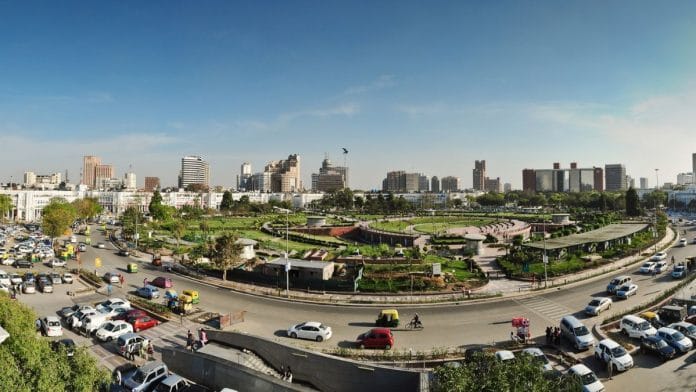New Delhi: Key amendments in the Delhi Development Act, 1957—a central legislation that empowers Delhi Development Authority (DDA) to plan and develop land in the national capital—have been stuck for over 2 years.
These amendments, meant to pave the way for greenfield development in the city, were put up for public scrutiny in August 2022. However, even after more than 2 years, the Union Ministry of Housing and Urban Affairs (MoHUA) is unlikely to table the amendments in the winter session of Parliament, ThePrint has learnt.
The amendments are crucial for the implementation of several policies such as land pooling and urban regeneration, which has been stuck since being announced first in 2013, and aims to provide close to 17 lakh houses in New Delhi.
In August 2022, the MoHUA proposed a critical and contentious change related to the aggregation of land under the land pooling policy, which was notified by the DDA on 11 October, 2018, for the second time. The government proposed a provision, making it “mandatory” for land owners to pool their properties, once owners of 70 percent of the development area in a land pooling sector (measuring between 100 and 150 hectares) have pooled their land.
This provision has been proposed because 70 percent “contiguous land parcel” in a land pooling sector is needed for the policy to be implemented.
Since 2018, the DDA has been unable to implement the policy despite several efforts to woo land owners. In some sectors, 70 percent of land owners have agreed to pool their land under the policy, but the land parcels are not contiguous, a senior DDA official told ThePrint.
“The ministry had received about 200 objections and suggestions to the draft amendments. There were some concerns regarding the clause pertaining to making it mandatory for land owners to participate. So far, no decision has been made regarding the amendments in the Act. They are yet to get the Cabinet’s approval,” a senior housing ministry official, who wished to not be named, told ThePrint.
ThePrint reached the ministry via email and WhatsApp for a comment. This report will be updated if and when a response is received.
A section of Experts has said that the provision for mandatory participation will result in litigation.
“The ‘mandatory’ provision will only lead to litigation and further stall the policy. There is a need to relook at the land pooling policy and study other models such as the one in Gujarat, where large scale development has happened through land pooling,” Paras Tyagi, co-founder of Centre for Youth Culture Law and Environment, a Delhi-based non-profit organisation working with landowners, told ThePrint.
Urban planning expert Sabyasachi Das, who was with the DDA’s planning wing, told ThePrint that amendments in the Act are essential not only for land pooling, but also for the implementation of the Green Development Area policy, which provides for regulated development in villages, among others.
“The current Act doesn’t have provision for unauthorised colonies. With the Centre now giving ownership rights and providing for regeneration of unauthorised colonies, the Act has to be amended. Similarly, the draft Master Plan of Delhi-2041 has a provision for transferable development rights,” Das said.
“It is a new concept to acquire land in developed areas to put essential services in place in exchange for development rights in other parts of the city. However, the current DD Act doesn’t permit it,” he added.
‘Delay in amendments resulting in unplanned development’
For a large section of land owners in the city in New Delhi, it has been a long wait to get the land pooling policy implemented so that they can get the right value of their land.
DDA officials said that the work to implement the policy has started. In response to a parliamentary question in August this year by the Bharatiya Janata Party (BJP)’s Kamaljeet Sehrawat, Lok Sabha MP from West Delhi, the housing and urban affairs ministry said it has “allowed issuance of Provisional Notice (to be issued by DDA) for formation of Consortium, even where ‘contiguity’ condition is not met to facilitate the policy.”
However, land owners have said that it is just on paper.
“There is no sector where the policy can be implemented,” Bhupender Bazad, president of Delhi Dehat Vikas Manch’s master plan committee, told ThePrint.
“Due to the delay, we are not getting the right value of our land whereas in neighbouring Gurugram, the land prices have increased manifold. Ever since 2013, we have been unable to get mutation (change in property title) done,” he added.
A section of urban land policy experts say that further delay will only result in unauthorised development in the city’s greenfield areas.
Ramesh Menon, a policy analyst for the Delhi Consortiums, a group of real estate policy experts, told ThePrint that the mandatory clause ensures participation by all landowners and contiguous land for development planning, with landowners receiving proportionate land back for monetisation at market rates.
He said, “The delay in the implementation of the policy has led to rampant unauthorised construction, because of which 200-300 acres, as per a rough estimate, is lost annually. The DDA should immediately notify the master, which will help build investor confidence. The notification will help in the development of Delhi on Public Private Partnership, where DDA can act as the facilitator and develop trunk infrastructure.”
(Edited by Radifah Kabir)






